
Blog
5 Tips for Making Your Home More Energy Efficient
2/7/2024
As the fight against climate change intensifies, it is important to recognize that every individual has a role to play in reducing their carbon footprint. One significant step towards this goal is to ensure that our homes are energy efficient. With approximately 90% of buildings being single-family homes, homeowners have the power to make a substantial impact.
Here are five tips to help you make your home more energy efficient:
1. Install Proper Insulation
Inadequate insulation can lead to significant energy loss in your home. By properly insulating your walls, attic, and floors, you can prevent heat from escaping during the winter and keep cool air inside during the summer. This not only reduces your energy consumption but also improves the overall comfort of your home. We recommend you work with a professional who can identify your home's specific needs. A great place to start is to have an Energy Assessment of your home.
2. Seal Air Leaks
Air leaks are a major source of energy waste in homes. Common areas where air leaks occur include windows, doors, and gaps around pipes and electrical outlets. There are many methods to seal air leaks. Professionals use high-quality, tested methods and materials. If you're making an attempt on your own, generally many leaks can be at least temporarily patched using weatherstripping, mastic tape, or caulking to prevent drafts and keep conditioned air from escaping. This simple step can lead to substantial energy savings. Each home is unique, though, and we caution against DIY attempts due to combustion gas and other safety issues. For instance, we once did a home evaluation and found that a homeowner had unwittingly sealed the furnace vent to outside, causing a dangerous carbon monoxide leak. A professional with training and experience can not only spot these issues and alert the homeowner but also recommend fixes.
3. Optimize Heating and Cooling Systems
Heating and cooling account for a significant portion of a home's energy consumption. To maximize efficiency, regularly maintain your HVAC (heating, ventilation, and air conditioning) system. Clean or replace air filters, seal ductwork, and consider upgrading to a programmable thermostat. These small adjustments can lead to substantial energy savings over time.
4. Switch to LED Lighting
Traditional incandescent bulbs consume a significant amount of energy and have a short lifespan. By switching to LED (light-emitting diode) bulbs, you can reduce your energy usage by up to 80% and enjoy a longer-lasting lighting solution. LED bulbs are not only more energy efficient but also produce less heat, making them safer to use.
5. Upgrade to Energy-Efficient Appliances
One of the most effective ways to reduce energy consumption in your home is by replacing outdated appliances with energy-efficient models. Look for appliances with the Energy Star label, as they are designed to use less energy without compromising performance. From refrigerators to washing machines, these appliances can significantly reduce your electricity usage.
By implementing these five tips, you can make a significant impact in reducing your home's energy consumption and carbon footprint. Not only will you contribute to the fight against climate change, but you will also enjoy the benefits of lower energy bills and a more comfortable living environment.
The Importance of Energy Assessments for Identifying Home Energy Loss
2/3/2024 min read
Our BPI certified Energy Assessors offer services throughout Southeastern Wisconsin. Please visit our Energy Assessment page to choose an option and sign up for a visit.
Energy assessments are an invaluable tool for homeowners looking to identify and address energy inefficiencies in their homes. By employing scientific principles and advanced techniques, these assessments help pinpoint areas where homes may be losing energy, such as gaps and insufficient insulation.
Understanding Energy Assessments
An Energy Assessment, also known as an Energy Audit or Home Energy Assessment, is a comprehensive evaluation of a home's energy performance. It involves a thorough examination of various factors that contribute to energy loss, including insulation, air leakage, heating and cooling systems, and appliances.
During an Energy Assessment, a trained professional conducts a series of tests and visual inspections to identify areas of concern. These may include using thermal imaging cameras to detect heat loss, measuring air leakage with a blower door test, and analyzing energy bills to evaluate energy usage patterns.
The Benefits of Energy Assessments
Energy Assessments offer numerous benefits for homeowners:
Identifying Energy Inefficiencies: By pinpointing areas where energy is being lost, homeowners can take targeted measures to improve energy efficiency and reduce utility bills.
Enhancing Comfort: Energy Assessments can help identify areas that contribute to drafts, uneven temperatures, and discomfort in the home. Addressing these issues can lead to a more comfortable living environment.
Reducing Environmental Impact: By improving energy efficiency, homeowners can minimize their carbon footprint and contribute to a greener and more sustainable future.
Increasing Home Value: An energy-efficient home is often more attractive to potential buyers and can command a higher resale value.
Accessing Incentives and Rebates: Many utility companies and government programs offer incentives and rebates for energy-efficient upgrades. An Energy Assessment can help homeowners identify which upgrades qualify for these financial incentives.
Addressing Energy Loss
Once energy inefficiencies have been identified through an Energy Assessment, homeowners can take appropriate steps to address them. These may include:
Sealing gaps and cracks in the building envelope to reduce air leakage.
Adding or improving insulation in walls, attics, and crawl spaces to minimize heat transfer.
Upgrading to energy-efficient windows and doors.
Optimizing heating and cooling systems through regular maintenance and potentially replacing outdated equipment.
Installing energy-efficient appliances and lighting.
It is important to note that Energy Assessments should be conducted by qualified professionals who have the necessary expertise and equipment to accurately assess a home's energy performance. Homeowners should seek out certified energy auditors or contractors with experience in conducting Energy Assessments.
Conclusion
An Energy Assessment is a valuable tool for homeowners looking to improve energy efficiency, reduce utility bills, and create a more comfortable living environment. By identifying areas of energy loss, homeowners can take targeted measures to address these issues and ultimately enhance the overall energy performance of their homes.
Our BPI certified Energy Assessors offer services throughout Southeastern Wisconsin. Please visit our Energy Assessment page to choose an option and sign up for a visit.
Protecting Your Home from Winter Ice Dams
1/22/24
Winter brings with it a picturesque landscape of snow-covered rooftops and glistening icicles. While these scenes may be beautiful, they can also pose a serious threat to the structural integrity of your home in the form of ice dams. Ice dams are a common winter problem that can cause significant damage if not addressed promptly.
What are Ice Dams?
Ice dams are ridges of ice that form at the edge of a roof, preventing melting snow from properly draining off. As the snow on the roof melts, it runs down towards the eaves, where it refreezes due to the colder temperatures. Over time, this process creates a dam-like barrier that traps water on the roof. The trapped water can seep into the roof, causing damage to the shingles, insulation, and even the interior of your home.

Preventing Ice Dams
Preventing ice dams requires a combination of proper insulation, air sealing, and proactive maintenance. Here are some steps you can take to protect your home:
Insulate your attic: Adequate insulation in the attic helps to keep the roof cold and prevent the snow from melting. Make sure to seal any gaps or cracks where warm air may escape into the attic.
Clear snow from the roof: Using a roof rake or hiring a professional, remove snow from the roof after each significant snowfall. This will prevent the buildup of snow and reduce the likelihood of ice dams forming.
Seal air leaks: Inspect your home for any air leaks in the attic, such as the entrance, gaps around the chimney ("chimney chase") and bathroom fans. Seal these gaps with spray foam, caulk or rigid barrier to prevent warm air from escaping into the attic. Our call Green Homeowners United to do that work for you!
Let Green Homeowners United Help You!
Video courtesy of Focus on Energy
2023 Special Report on Green and Healthy Construction Careers
Learn more about our extensive report on residential construction jobs in Wisconsin and what is needed for our state to succeed
REPORT - JOBS - CAREERS - GREEN FUTURE
9/26/2023
A Wisconsin 2023 Snapshot of Green & Healthy Residential Construction Careers: Emerging Green Skills, Review of Future Workforce Requirements
What is the future work going to look like for someone looking to make a difference in Wisconsin homes? How can we ensure Wisconsin will be ready for the federal funds coming to upgrade our state’s homes? And how do we ensure that these are family supporting jobs that retain skilled workers and contractors for the long haul? These is the questions we at Green Homeowners United sought to answer through a series of interviews and reflections with over a dozen experts in Wisconsin in the areas of affordable housing, energy efficiency, healthy-home improvements and workforce development.
We interviewed Wisconsin experts and asked them to describe the current climate for residential laborers working on energy-efficiency improvements, healthy-home upgrades and repairs generally; as well as what the future looked like for them. From these expert’s opinions, we are making a series of recommendations to policymakers as they seek to implement upcoming federal funding from such laws at the Inflation Reduction, Bipartisan Infrastructure Law and more.
Samples of the recommendations in this report:
-Take steps to implement the Inflation Reduction Act residential provisions as soon as is feasible. Other programs that hire contractors for green or healthy home improvements we recommend utilize as much as possible now before the IRA rebates are available, to allow contractors to scale up now in preparation.
-Prioritize the training of insulation installers, lead abatement workers and energy assessors
-We recommend the creation of a “Green and Healthy Home Residential Apprenticeship” program, or similar ongoing training program for Residential Laborers.
-Programs that have the ability to wage or benefit standards should do so (more fully covered in the report) to ensure workers leave the field for other sectors
-We recommend a regional or statewide financing option for green and healthy home improvements be established that works with contractors to facilitate education and consumer enrollment, to name a few.
Throughout this report you will see the term energy efficiency, or “green” and healthy home jobs, as well as residential jobs. While there are many careers that address both energy efficiency and occupant health triggers in the home, for the purpose of this report we are focusing exclusively on residential jobs that are generally not already part of an existing apprenticeship program and do not require a special master license to operate. These jobs do however require emerging skills and in particular green skills.
Insulation installers, energy assessors, lead abatement workers, residential window installers, home repair experts, residential drywall repair workers, home inspectors, home rehab contractor, asbestos abatement worker, roofers, siding installers and solar panel installers. Jobs that, because of their lack of specialized certification or licensure requirements, are often switched between during the course of a residential laborer’s work scope.
This report does not focus on professions such as plumbers, electricians, HVAC technicians, or operating engineers. It is our position that “Residential Laborer” is the best way of describing the ample work needed to abate residential environmental hazards, to weatherize homes to cut carbon emissions, and to repair aging housing stock.

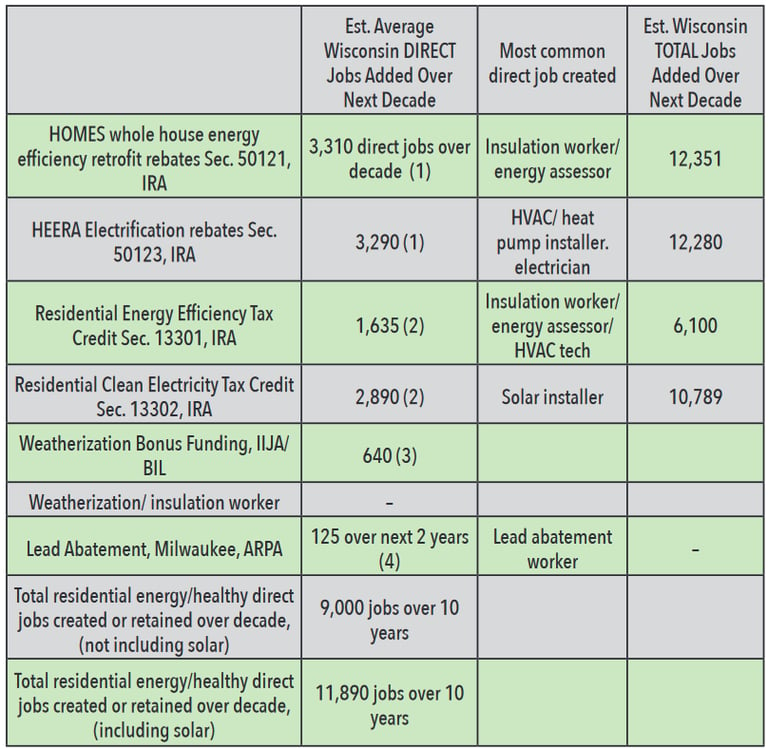

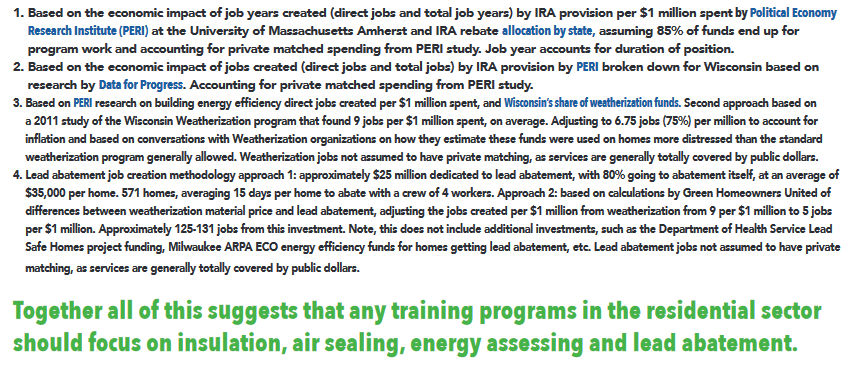


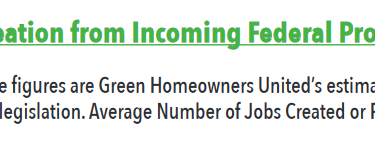
Inflation Reduction Act Rebates & Tax Credits
Tens of Thousands of Wisconsin Homes Eligible for Significantly Subsidized or Even No-Cost Energy Efficiency Improvements from Inflation Reduction Act!
Kevin Kane
6/27/20234 min read
The Inflation Reduction Act, passed by Congress and signed by the President in August, has billions allocated for residential energy efficiency improvements, such as for heat pumps to provide heat more efficiently, insulation and stopping air leaks. And moderate income homeowners can anticipate increased instant rebates to bring larger improvements into financial reach. This transition of all homes to a more efficient state is vital, as studies show residential energy efficiency is one of the most important steps needed to stop climate change.
Two new instant rebates - the Electrification rebates and the HOMES rebates - that immediately reduce the sticker price of consumer's home improvements will soon be available, and at a higher level for moderate income homeowners. "We have the opportunity, thanks to the Inflation Reduction Act, to affordably upgrade tens of thousands of homes. To create good jobs and help homeowners, regardless of income", said Kevin Kane, Chief Economist for Green Homeowners United. "Right now union workers with good wages & benefits are installing insulation and upgrading windows in homes, and soon we can supercharge that. We can further transform dwellings, create high skilled family supporting jobs and help the planet all at once!"
"My home is one of the thousands in Wisconsin without air conditioning", said Ann Knoedler, resident of Milwaukee's Sherman Park neighborhood. "We've recently insulated our attic and sealed air leaks, but we want to do more to be green homeowners. Under the Inflation Reduction Act my home will be one of those eligible to get a heat pump mostly if not fully paid for, I can have air conditioning now and more efficient heating to further reduce my carbon emissions!"
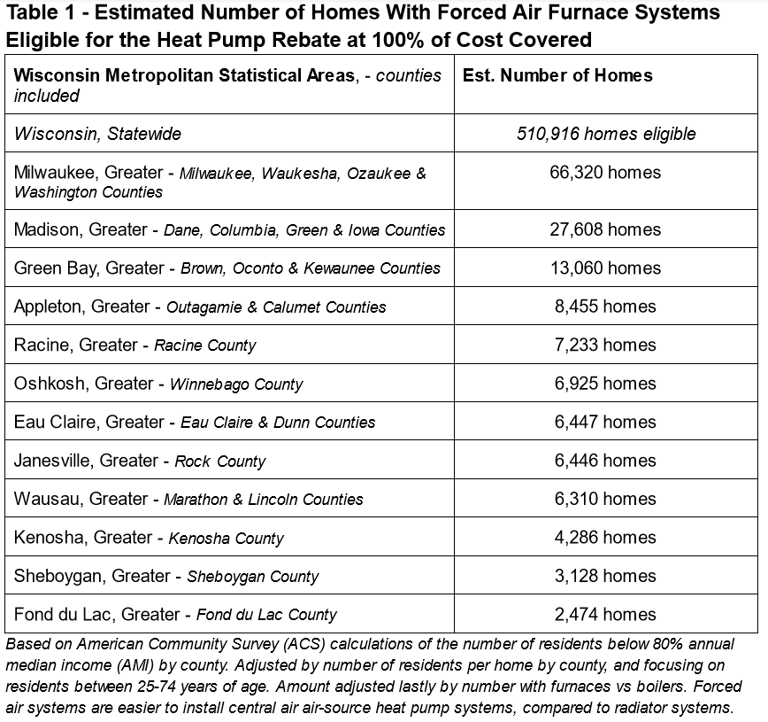

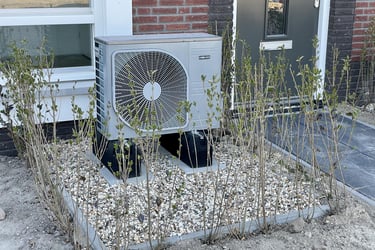

“As someone who wanted to ensure my home was one of the most energy efficient in the nation, having a heat pump was a no-brainer,” said Lisa Geason-Bauer, resident of Nashotah, Wisconsin and owner of Evolution Marketing, LLC. “I have the ability to not burn fossil fuels to heat my home because it can be powered by my solar panels. So as natural gas rates keep going up, I’m protected!”
"We have the opportunity, thanks to the Inflation Reduction Act, to affordably upgrade tens of thousands of homes. To create good jobs and help homeowners, regardless of income", said Kevin Kane, Chief Economist for Green Homeowners United. "Right now union workers with good wages & benefits are installing insulation and upgrading windows in homes, and soon we can supercharge that. We can further transform dwellings, create high skilled family supporting jobs and help the planet all at once!"
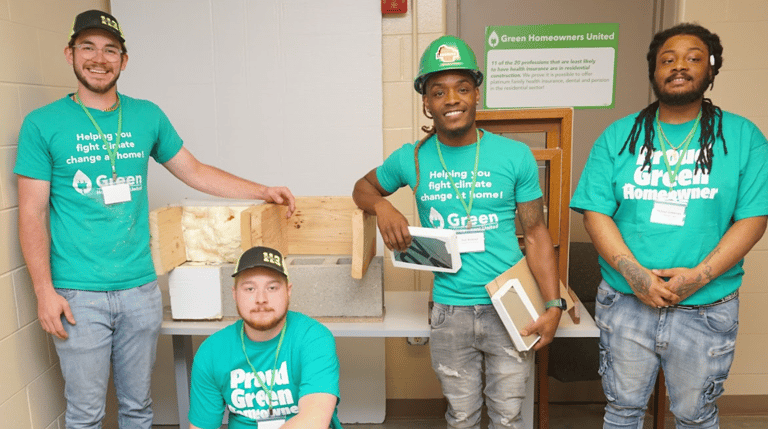

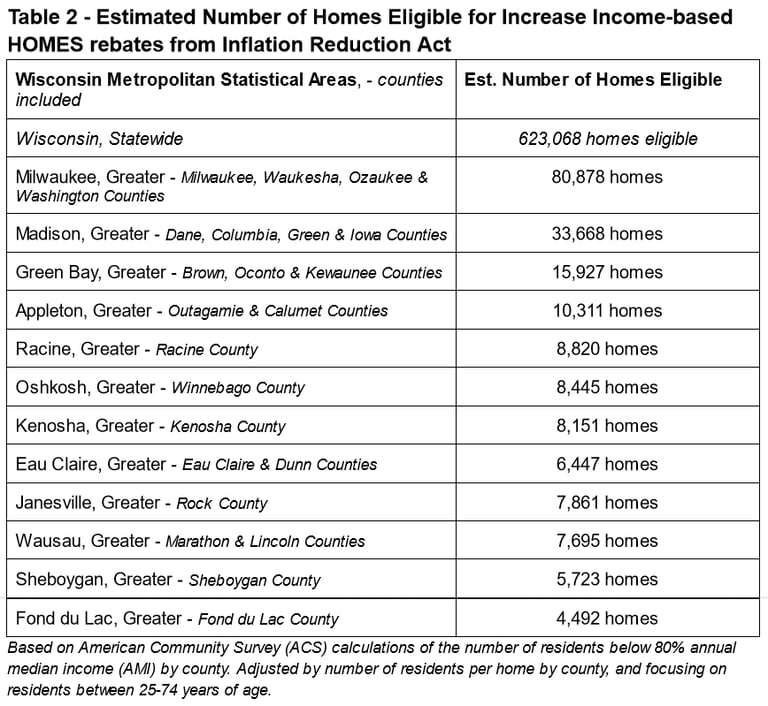

Left to right: Harrison, Jack, Josh, and Michael
Reductions of utility bills of 20%+ and 35%+ are most likely to be achieved in the traditional older homes by (1) sealing air leaks, usually in attics and basements, (2) insulating attics and “dense-packing” empty walls, (3) insulating basement walls, (4) upgrading older heating systems and (5) replacing single pane windows with Low-E coated double or triple pane alternatives. Rebates are anticipated to be available in 2024.
In the meantime, homeowners should identify a qualified energy assessor and/or heating professional knowledgeable about heat pumps and the new rebate rules to prepare. Homes can sign up for energy assessments now to determine which improvements would make them eligible for the large HOMES rebate.
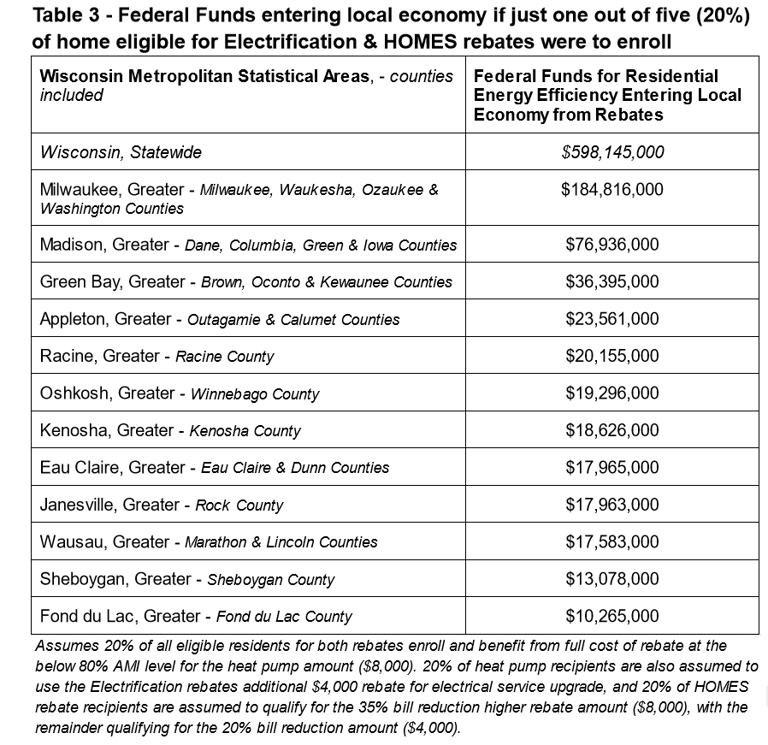

Green Homeowners United is a woman-owned, lead-certified social enterprise built to help residents take on climate change from home. We believe it is possible to do right by homeowners, workers and the planet. Green Homeowners United’s workers are members of Laborers Local 113. Green Homeowners United performs the energy assessments and economic modeling, installs the building improvements, and guides clients through various incentive programs available to make projects more affordable. Contact us to learn more, click here to find out what incentives you may be eligible for.
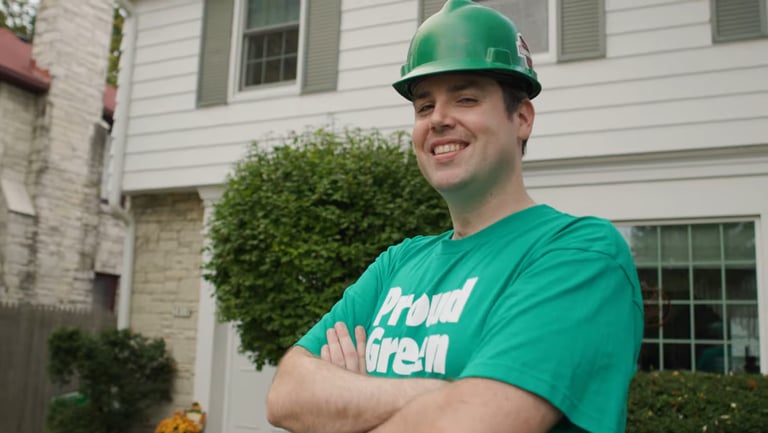

Kevin Kane, Chief Economist
Why Won't We Discount Energy Assessments?
Certain companies offer them for $99. Consider reading why we don't.
6/1/2023
One of the frequent questions we get is why we don't offer $99 Assessments. There are some companies who do and market it a lot. We've been asked our fair share of folks to match that rate.
We can't blame people for asking, but there are reasons we say no.
Why do we say no?
There are good reasons a person wouldn't get a $0.99 haircut....
You Get What You Pay For
We've seen the $99 reports. They are basic and lack significant details and statistics that help people understand their home. To be clear, I’m not saying the Assessors are unprofessional or didn’t do a good job, but rather that the report provided by the company afterward does not have what we consider to be a complete report with details to help you make informed decisions about your home.
If you’re looking for the most basic eval of your home and then a strong upsell on services, the discounted rates from other companies might suit you. For us, it is not compatible with our mission of educating homeowners and helping empower you to make the best decisions possible about your home’s energy efficiency.
Our Team is Well Educated and Experienced
When we do an Energy Assessment, one of our BPI-certified professionally trained Energy Assessors creates the report and recommendations for your specific home. The training is intensive, and the certification requires regular continuing education. Our Assessors are the ones compiling and reviewing the data, and for people who choose us to complete energy efficiency upgrades the Assessors are involved in the planning process, training our team, and designing the scope of work.
Our Assessors and installation teams are also union members of LiUNA 113. Not only does Green Homeowners United’s union contract help set the prevailing wage for our state, it also provides lots of protections for workers, training, pension, and health benefits. One of our core mission values is doing right by workers. We don’t believe that churning and burning staff is the right thing to do for anyone.
We’re a Small Company and We Shop Local
The advantage of a smaller company is that we put money back into our community. We live and work in West Allis, WI. A lot of our competitors are based out-of-state, and though they employ local folks, most of their infrastructure and administration is located elsewhere, often well across the country. All of our professional services are located in Wisconsin, like Absolute Payroll, Statewide Insurance, Evolution Marketing, Complete & Accurate Books, Tenaglia & Associates Accounting, to name a few. These are unsolicited endorsements, we like working with these folks. We believe that shopping local as much as we can helps make sure our communities are strong.
We locally source as many supplies as we can whenever financially feasible. We live in a globalized economy, but we make a good faith effort to source as close to home as we can. This means we use local vendors, hire local people, and try to work with other small businesses to source products (some of which are only manufactured overseas, unfortunately). Shopping local might cost a few pennies more in the short term, but in the long term everyone benefits. And honestly, the prices aren’t that different but the service certainly is.
Ultimately though, we don’t discount Energy Assessments because we believe we’re delivering the full worth at the price we charge. It's like the old adage: would you like it done cheaply or well? We work on quality, not quantity.
--Sadie Tuescher, President
Green Homeowners United


Address
9618 W Greenfield Ave
West Allis, WI 53214
Appointment recommended
Contact
414-604-6450
info@GreenHomeownersUnited.com


